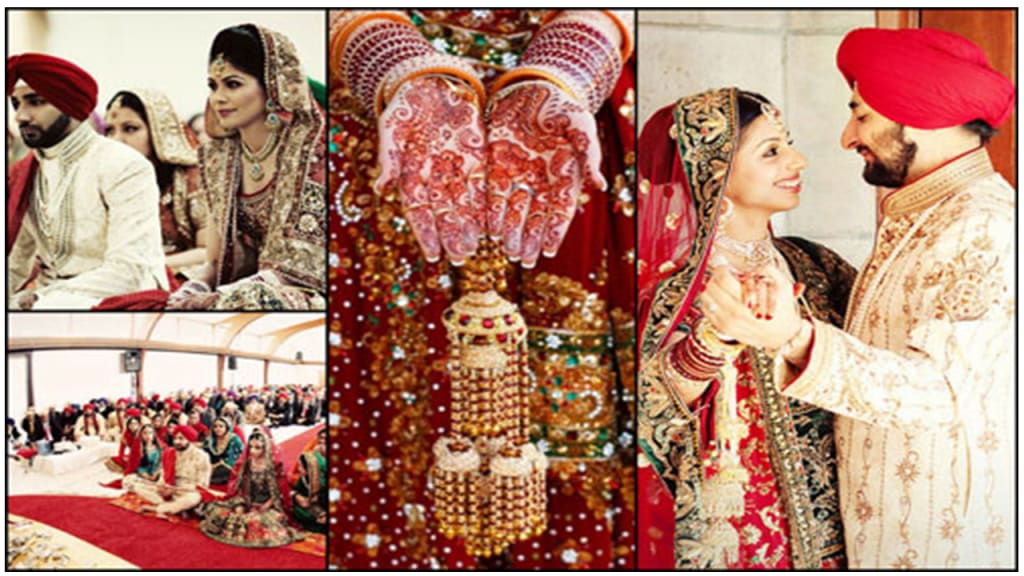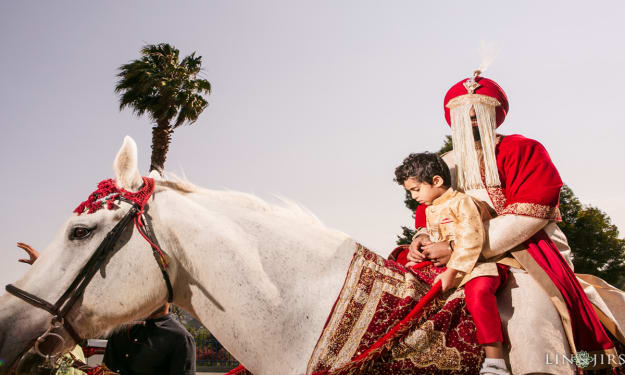Saha: The Auspicious Hour of Marriage
Rituals in Punjabi Marriage

Saha: The Auspicious Hour of Marriage
Marriage is a sacred and joyous union celebrated in diverse cultures around the world. In Hindu traditions, the selection of the perfect day and time for a wedding holds great significance. It is believed that the alignment of celestial bodies at a specific moment can influence the couple's future life together. This practice, known as Saha, involves consulting an astrologer to determine the auspicious hour for the marriage ceremony. Let us delve deeper into the customs and beliefs surrounding Saha and its role in Hindu weddings.
According to Jotish, the ancient Hindu astrology system, the Mahurat, or the auspicious hour, is a vital consideration when planning a wedding. The Mahurat determines the most favorable alignment of planetary positions, which is believed to bring blessings, prosperity, and harmony to the couple's married life. The consultation with an astrologer helps identify the ideal day, date, and time for the marriage ceremony, ensuring that it takes place during an auspicious period.
The concept of Saha is deeply rooted in Hindu culture and is regarded as an important aspect of wedding preparations. Families seeking to celebrate the union of their loved ones traditionally consult an astrologer well in advance of the wedding date. The astrologer analyzes the birth charts of the bride and groom, taking into account their planetary positions and the cosmic influences on their lives. Based on this analysis, the astrologer suggests a range of auspicious dates and times for the marriage ceremony.
The process of selecting a Saha involves considering various astrological factors. The astrologer examines the positions of celestial bodies, such as the sun, moon, and planets, at the time of the wedding. Additionally, factors such as the zodiac signs, nakshatras (lunar mansions), and tithis (lunar days) are taken into account. The goal is to find a harmonious alignment of these elements to ensure a prosperous and blissful married life for the couple.
The astrologer presents the families with a list of potential Mahurats, which are typically expressed in terms of a specific date and time range. These Mahurats are meticulously calculated, taking into consideration the planetary positions and their impact on the couple's horoscopes. The families then evaluate the options and select the most suitable Mahurat that aligns with their preferences, traditions, and logistical considerations.
Once the Saha is finalized, preparations for the wedding intensify. The families commence organizing various ceremonies and rituals associated with the marriage, including engagement ceremonies, pre-wedding rituals, and the main wedding ceremony itself. Each of these events is carefully planned to occur within the chosen auspicious time period, ensuring that the couple receives the blessings of the celestial forces and a prosperous start to their married life.
It is important to note that the practice of Saha is not limited to determining the wedding day alone. The concept of an auspicious hour extends beyond weddings and encompasses other significant life events, such as starting a new business, moving into a new house, or embarking on a long journey. In these cases, individuals may also consult an astrologer to find the most opportune time to initiate these endeavors. The belief is that commencing important undertakings during an auspicious period can enhance the chances of success and bring positive outcomes.
While Saha holds great significance in Hindu weddings, it is important to acknowledge that not all communities or individuals follow this practice. In some cases, couples may opt for a more convenient or practical date, considering factors such as availability of family and friends, professional commitments, or personal preferences. Ultimately, the decision to adhere strictly to Saha or to prioritize other considerations rests with the couple and their families.
In conclusion, Saha plays a significant role in Hindu wedding customs, emphasizing the importance of selecting an auspicious hour for the marriage ceremony. Drawing from the ancient wisdom of Jotish, families consult astrologers to identify the most favorable day, date, and time for the wedding. This practice ensures that the couple begins their married life during a harmonious alignment of celestial bodies, bringing blessings and prosperity to their union. While the concept of Saha is deeply rooted in tradition, its observance may vary among individuals and communities. Ultimately, the choice to follow Saha or prioritize other factors in wedding planning is a personal decision, allowing couples to create a meaningful and memorable celebration of their love.
About the Creator
Dr. Amjad Ali Bhatti
Dr. Amjad Ali Bhatti is a multifaceted individual who has made significant contributions in the fields of research, translation, literature, and social activism.






Comments
There are no comments for this story
Be the first to respond and start the conversation.